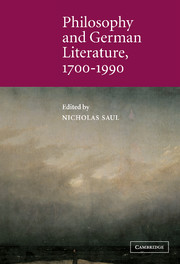Book contents
- Frontmatter
- Contents
- Contributors
- Acknowledgements
- List of abbreviations
- Introduction: German literature and philosophy
- Chapter One Criticism and experience: philosophy and literature in the German Enlightenment
- Chapter Two The pursuit of the subject: literature as critic and perfecter of philosophy 1790–1830
- Chapter Three Two realisms: German literature and philosophy 1830–1890
- Chapter Four Modernism and the self 1890–1924
- Chapter Five The subjects of community: aspiration, memory, resistance 1918–1945
- Chapter Six Coming to terms with the past in postwar literature and philosophy
- Bibliography
- Index
Chapter One - Criticism and experience: philosophy and literature in the German Enlightenment
Published online by Cambridge University Press: 22 September 2009
- Frontmatter
- Contents
- Contributors
- Acknowledgements
- List of abbreviations
- Introduction: German literature and philosophy
- Chapter One Criticism and experience: philosophy and literature in the German Enlightenment
- Chapter Two The pursuit of the subject: literature as critic and perfecter of philosophy 1790–1830
- Chapter Three Two realisms: German literature and philosophy 1830–1890
- Chapter Four Modernism and the self 1890–1924
- Chapter Five The subjects of community: aspiration, memory, resistance 1918–1945
- Chapter Six Coming to terms with the past in postwar literature and philosophy
- Bibliography
- Index
Summary
Selbst die philosophische Wahrheit, die auf die Erleuchtung des Verstandes zielet, kan uns nicht gefallen, wenn sie nicht neu und unbekannt ist.
Was endlich die Deutlichkeit betrifft, so hat der Leser ein Recht, zuerst die diskursive (logische) Deutlichkeit, durch Begriffe, denn aber auch eine intuitive (ästhetische) Deutlichkeit, durch Anschauungen, d. i. Beispiele oder andere Erläuterungen, in concreto zu fodern.
PREAMBLE: MAPPING THE TERRAIN
To write an introductory chapter on philosophy, literature, and Enlightenment in the eighteenth century is a daunting task. Realistically, one can offer at best a blueprint for reading individual works of the eighteenth century. Since Pythagoras, Aristotle and Plato, thinkers have had a direct and above all an indirect impact on the intellectual life of subsequent generations in every sphere. It was no different for René Descartes (1596–1650), John Locke (1632–1704), Anthony Ashley Cooper, Earl of Shaftesbury (1671–1713), Benedictus de Spinoza (1632–77), Gottfried Wilhelm Leibniz (1646–1714), Charles de Montesquieu (1689–1755), Jean-Jacques Rousseau (1712–88) or Claude Adrien Helvétius (1715–71). These thinkers launched scholarly debates which spilled over into the more general realm of literature and the public sphere, giving birth to what the Swiss aesthetician Johann Jacob Breitinger (1701–76) labelled ars popularis (popular art) around 1740. Fifty years later Christian Garve (1742–98) lauded this style and tone as the best approach for reaching the majority of educated readers – whether of literature or philosophy. Popularity in this sense was grounded in the desire to be read outside the academy and to be of practical use.
- Type
- Chapter
- Information
- Philosophy and German Literature, 1700–1990 , pp. 13 - 56Publisher: Cambridge University PressPrint publication year: 2002
- 3
- Cited by



